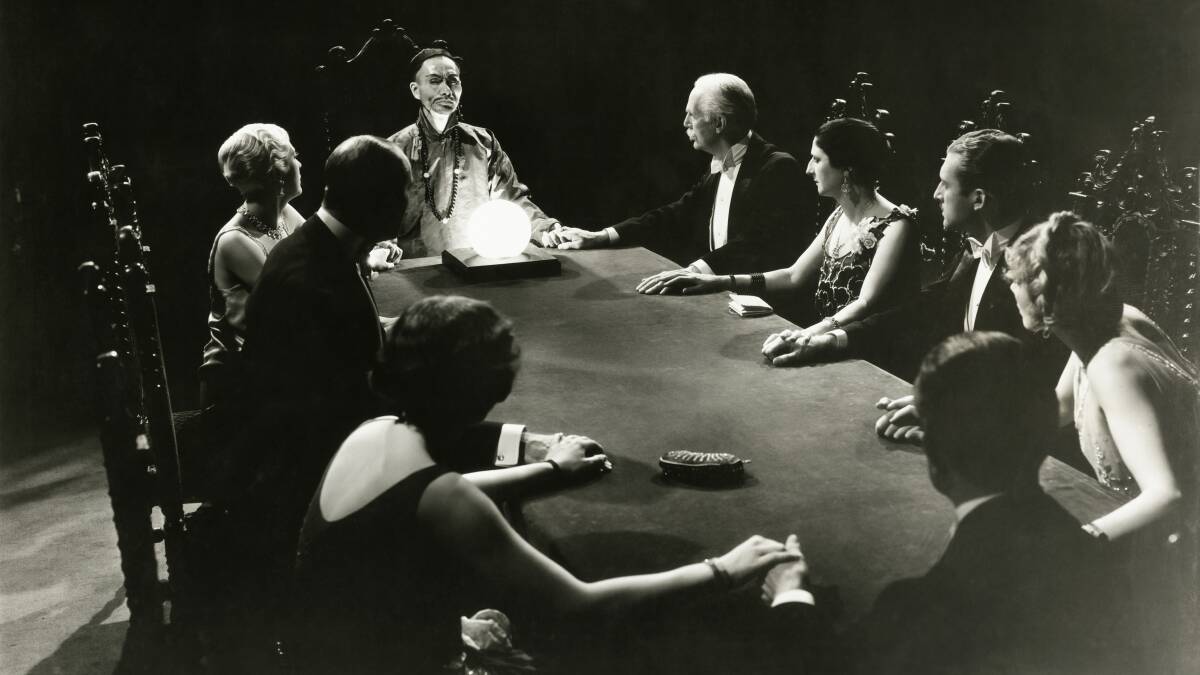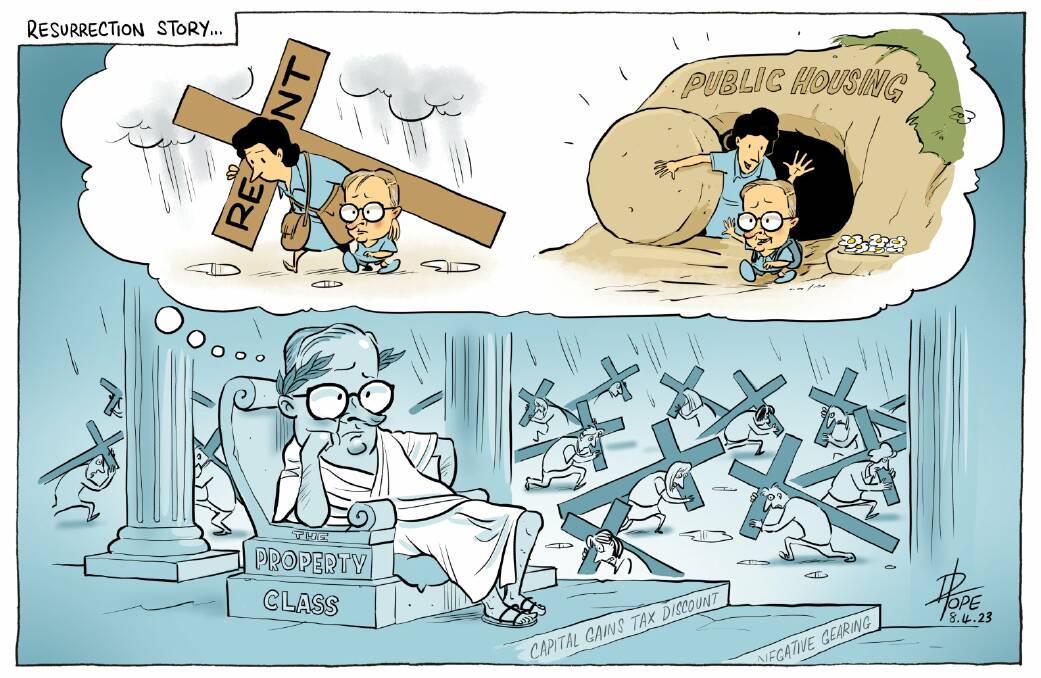This is a sample of The Echidna newsletter sent out each weekday morning. To sign up for FREE, go to theechidna.com.au
The house, like so many stained by blood and horror, was supposed to be haunted. But hopes of a ghostly encounter appeared slim when I rang its front doorbell one summer morning not long ago. The only sound inside was the blaring noise of television cartoons and the laughter of children.
I'd arrived at the home in suburban Melbourne because 130 years earlier the discovery of a dead woman's body in one of its bedrooms had sparked the greatest manhunt in Australian colonial history. The murder captivated a global audience of millions with sordid tales of murder, bigamy, robbery and ghostly hauntings.
It was another of those astonishing 19th century stories they never teach in Australian history class. And it had all begun inside that house when Frederick Deeming, a serial killer, suspect in the Jack the Ripper murders and a man The New York Times dubbed "the greatest criminal of the century", slit the throat of his second wife just before Christmas in 1891.
The Victorian-era home had been lovingly restored and its latest owners - a couple with two young children - were happy to let me look around. I was researching a book about Deeming and they asked only that we talk quietly. The mother didn't want to scare the kids.
She guided me down a long hall and into the second bedroom where Deeming had hidden his wife's body beneath a fireplace. We whispered about the home's gruesome past and the notoriety it generated. The case was steeped in the spiritualism craze of the era. Deeming, a notorious bigamist and swindler, claimed at his trial that the ghost of his mother had urged him to kill. His lawyer, the future Australian prime minister Alfred Deakin, had been a strident believer in the spirit world and was married to a prominent medium who claimed to channel messages from the dead.
Had the latest occupants of the house ever encountered an unearthly presence? The children's mother paused. She didn't believe in that stuff, she said. But sometimes when she was alone in that room she felt something watching her. She smiled, shrugged and left me alone to take notes.
Moments later I understood what she meant. I knew it was my imagination at work. I'm not just a sceptic but a cynic when it comes to the paranormal. But there was no mistaking that sense of being watched. I could feel the hairs on my neck rising. A shiver slowly made its way down my spine. My mouth went dry. I turned around. Nothing was there.

There's no underestimating the power of the human imagination, or our desire to believe in an afterlife. Religions in all their forms wouldn't exist without it. Perhaps you're one of those non-believers who wouldn't be caught dead attending a séance. But it's not hard to miss the fact that ghosts are staging another comeback.
While it's nothing like the spiritualism fad that besotted Queen Victoria and the 19th century middle class, popular culture is again witnessing a spirited resurgence in tales of apparitions.
Ghost Story - a brilliant podcast by a sceptical British journalist investigating his family's secret past - has proved so popular around the world it will soon debut as a London stage show. A slew of recent best-selling crime and mystery books include hauntings and ghostly sightings. Streaming services have reported renewed interest in ghost movies and shows. Social media is experiencing a surge of interest in the supernatural while psychic mediums, who no doubt saw all this coming, say business has never been better.
Why? The paranormal craze of the 19th century reached a feverish peak in the early 1920s as a traumatised world grappled with the brutality of World War I and the Spanish Flu that eventually claimed 50 million lives. Scientific discoveries and rapid technological advances were also challenging traditional religious beliefs. Little wonder many turned to spiritualism's enthralling promise that death didn't necessarily signal the end of our existence.
Not hard to miss the parallels, is it? We're slowly emerging from a pandemic that claimed millions of lives and upended billions of others. We're experiencing unprecedented technological change, with emerging evidence the digital revolution is physically altering the way our brains work. And our world, at least politically, feels increasingly unstable (the famous Doomsday Clock measuring the likelihood of catastrophe remains at 90 seconds to midnight).
Scary times. No wonder we're turning to ghosts to lift our spirits.
Garry Linnell's book about Frederick Deeming, The Devil's Work, was published by Penguin Random House Australia.
HAVE YOUR SAY: Do you believe in ghosts? Have you seen one? Have you attended a seance? Would you spend the night in a haunted house? Email us: echidna@theechidna.com.au
SHARE THE LOVE: If you enjoy The Echidna, forward it to a friend so they can sign up, too.

IN CASE YOU MISSED IT:
- The chief of the Australian Defence Force has apologised to personnel and veterans for the military's failures, while pledging to do better. General Angus Campbell was giving evidence at the final public hearing day for the Royal Commission into Defence and Veteran Suicide.
- If you were in an emergency situation who would you call? Do you know their number from memory? New data from Telstra and YouGov shows that over half of Australians can't remember a single mobile or landline number by heart especially in an emergency situation.
- A sharp increase in customers abusing supermarket staff ahead of closures on religious holidays leaves workers in "fear they will be mistreated" by members of the public, a union survey has found. A record high of more than 80 per cent of retail workers experience verbal abuse on their shifts, the survey found.
THEY SAID IT: "To be seen is the ambition of ghosts, and to be remembered is the ambition of the dead." - Norman Brown
YOU SAID IT: Our classrooms are among the most disruptive in the OECD. But finally schools are rediscovering the benefits of discipline and boundary setting. Parents have a role to play too.
Tony recalls his school days and a maths teacher who dispensed corporal punishment "to the first in line (because he'd obviously been running) and the last in line (because he'd obviously been dawdling). We all talked about it over one lunchtime. The next maths session saw us standing in a circle. The teacher roared with laughter and there were no more strappings."
"John, with my brother, another ex-chalkie, I fell about laughing at the 'revelation' to which you refer," writes David of Burradoo, who taught for almost 40 years. "We watched as trends came and went, things like the beer-garden arrangement of desks which made the classroom more of a social scene rather than a workplace."
Paul, who thanks those teachers who soldier on, writes: "Your piece took me back more than 60 years ago, reliving some of my school-time memories. Yes, it was all very strict and respect for our teachers was just expected and enforced, often with a variety of corporal punishments. Our relationships with our teachers was a bit varied but generally it was healthy and good natured. And we learnt with minimal disruption!"
"My friend, a very experienced teacher of over 30 years with fantastic classroom management, will tell you where the problem lies," writes Lee. "Parents. And spineless school management. Sure, train the young teachers up a bit better re discipline, but they are only going to give up in disappointment."
Poor student behaviour is not the fault of teachers, writes Bruce. "The problem is school leadership which won't, or can't, provide strong support. And some parents; there was a time when if you were in trouble at school you knew there would be more consequences at home. Nowadays, you're more likely to have the parents on your doorstep the next morning, no appointment of course, demanding to know why you're picking on their child. And then school leadership asking if you could have handled the initial misbehaviour better."


